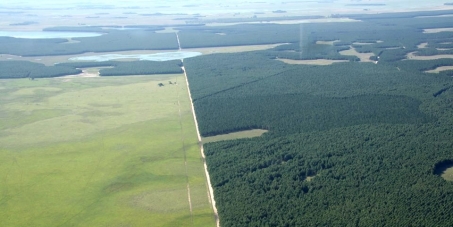
Harvard: Stop destroying the Iberá Wetlands!
Harvard University owns 212,500 acres of land in the heart of one of the world's largest reserves of freshwater: the Iberá Wetlands in Corrientes, Argentina. These lands are covered by pine and eucalyptus plantations, which are managed by two corporations—Las Misiones and EVASA.
Harvard spokesperson Kevin Galvin has defended the companies by pointing to their certification by the Forest Stewardship Council (FSC). FSC’s internationally recognized program seeks to ensure that certified timber companies are "environmentally appropriate, socially beneficial and economically viable.”
For many years, Friends of the Earth International, World Rainforest Movement (WRM), and many other non-profit organizations and social movements have criticized the FSC for certifying inherently unsustainable plantations that harm the environment and hurt local communities. In this case, FSC has certified irresponsible companies that continue to consolidate a massive amount of land and pay poverty wages to people who work unsafe jobs.
Despite the millions invested in Harvard’s plantation, the towns of San Miguel, Concepción, and San Roque have the highest unemployment and illiteracy rates in the province of Corrientes. The monoculture plantations also devastate the environment: they reduce the availability of water for farming, lower the water flow during the dry season, worsen summer droughts, create water shortages in local communities, and destroy the wetland ecosystem.
The Responsible Investment at Harvard Coalition recently visited the Iberá Wetlands to investigate the Harvard-owned companies. The Coalition and the Oakland Institute released a report on the companies, which has led to protests in front of Harvard President Drew Faust’s office. Students are outraged over their university’s unethical investments, and they are urging Faust to address the concerns of the most-affected communities.